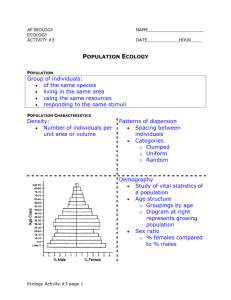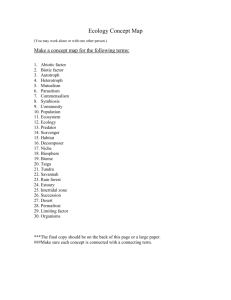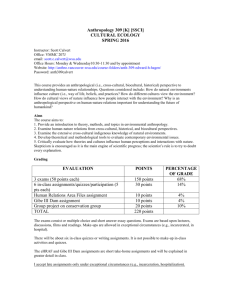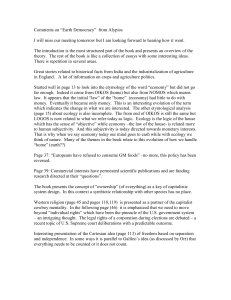Emergency Notification System
advertisement
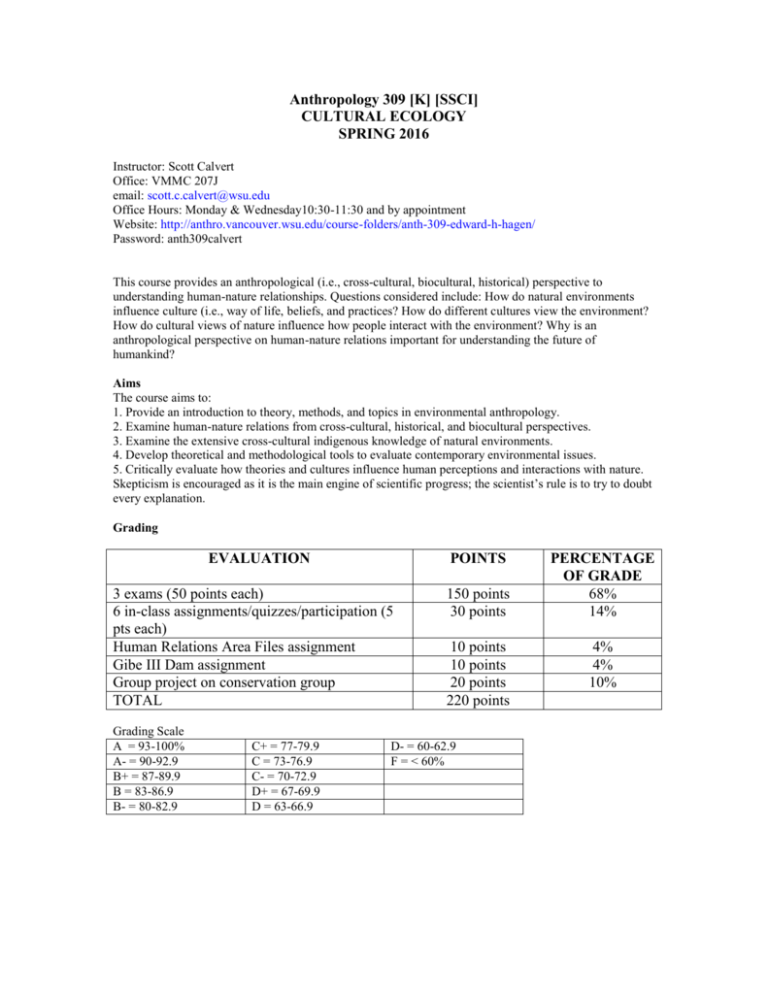
Anthropology 309 [K] [SSCI] CULTURAL ECOLOGY SPRING 2016 Instructor: Scott Calvert Office: VMMC 207J email: scott.c.calvert@wsu.edu Office Hours: Monday & Wednesday10:30-11:30 and by appointment Website: http://anthro.vancouver.wsu.edu/course-folders/anth-309-edward-h-hagen/ Password: anth309calvert This course provides an anthropological (i.e., cross-cultural, biocultural, historical) perspective to understanding human-nature relationships. Questions considered include: How do natural environments influence culture (i.e., way of life, beliefs, and practices? How do different cultures view the environment? How do cultural views of nature influence how people interact with the environment? Why is an anthropological perspective on human-nature relations important for understanding the future of humankind? Aims The course aims to: 1. Provide an introduction to theory, methods, and topics in environmental anthropology. 2. Examine human-nature relations from cross-cultural, historical, and biocultural perspectives. 3. Examine the extensive cross-cultural indigenous knowledge of natural environments. 4. Develop theoretical and methodological tools to evaluate contemporary environmental issues. 5. Critically evaluate how theories and cultures influence human perceptions and interactions with nature. Skepticism is encouraged as it is the main engine of scientific progress; the scientist’s rule is to try to doubt every explanation. Grading EVALUATION POINTS 3 exams (50 points each) 6 in-class assignments/quizzes/participation (5 pts each) Human Relations Area Files assignment Gibe III Dam assignment Group project on conservation group TOTAL Grading Scale A = 93-100% A- = 90-92.9 B+ = 87-89.9 B = 83-86.9 B- = 80-82.9 C+ = 77-79.9 C = 73-76.9 C- = 70-72.9 D+ = 67-69.9 D = 63-66.9 150 points 30 points 10 points 10 points 20 points 220 points D- = 60-62.9 F = < 60% PERCENTAGE OF GRADE 68% 14% 4% 4% 10% Exams consist or multiple choice and short answer essay questions. Exams are based upon lectures, discussions, films and readings. Make-ups are allowed in exceptional circumstances (e.g., incarcerated, in hospital). There will be about six in-class quizzes or writing assignments. It is not possible to make-up in-class activities and quizzes. The eHRAF and Gibe III Dam assignments are short take-home assignments and will be explained in greater detail in class. I accept late assignments only under exceptional circumstances (e.g., incarceration, hospitalization). Learning Goals WSUV has 7 learning goals: critical and creative thinking, quantitative reasoning, scientific literacy, information literacy, communication, and depth, breadth, and integration of learning. The course has elements of all learning goals, but emphasizes critical thinking, information literacy, quantitative literacy, diversity, depth and breadth of learning. The course has elements of all learning goals, but emphasizes critical thinking and self in society. The course introduces students to alternative ways of thinking and knowing and provides a framework for understanding and critically evaluating the assumptions, morality, and emotional basis of their own and other peoples’ behaviors and beliefs. You can read more about WSUV learning goals as they apply to anthropology at: http://anthro.vancouver.wsu.edu/programs/learning-goals/ Disability Accommodation Accommodations may be available if you need them in order to fully participate in this class because of a disability. Accommodations may take some time to implement so it is critical that you contact Disability Services as soon as possible. All accommodations must be approved through Disability Services, located in the Lower Level of the Student Resource Center, (360) 546-9138. Academic integrity Cheating in any form or plagiarism will not be tolerated. Plagiarism means using other people’s work and claiming it to be your own. The first time you are caught plagiarizing any portion of an assignment you will receive an “F” on the assignment and a possible failing grade in the course. Infractions will be reported to the Office of Student Conduct and entered into your permanent student record. Two such reports may results in expulsion from the University. For additional information about WSU’s Academic Integrity policy/procedures please contact (360) 546-9573. Emergency Notification System WSU has made an emergency notification system available for faculty, students and staff. Please register at zzusis with emergency contact information (cell, email, text, etc.). You may have been prompted to complete emergency contact information when registering for classes on RONet. In the event of a building evacuation, a map at each classroom entrance shows the evacuation point for each building. Please refer to it. Finally, in case of class cancellation campus-wide, please check local media, the WSU Vancouver web page and/or http://www.flashalert.net/. Individual class cancellations may be made at the discretion of the instructor. Individuals are expected to make the best decision for their personal circumstances, taking safety into account. Campus Safety Classroom and campus safety are of paramount importance at Washington State University, and are the shared responsibility of the entire campus population. WSU urges students to follow the “Alert, Assess, Act” protocol for all types of emergencies and the “Run, Hide, Fight” response for an active shooter incident. Remain ALERT (through direct observation or emergency notification),ASSESS your specific situation, and ACT in the most appropriate way to assure your own safety (and the safety of others if you are able). Please sign up for emergency alerts on your account at MyWSU. For more information on this subject, campus safety, and related topics, please view the FBI’s Run, Hide, Fight video and visit the WSU safety portal ANTH 309 – SPR 2016 COURSE OUTLINE JANUARY 1/ 11 - Introduction to the course, anthropology basics 1/13 - An introduction to history of theory and methods in cultural ecology - Marvin Harris, Julian Steward READ: “India’s sacred cow” by Marvin Harris READ: Fratkin textbook – Fieldwork among the Ariaal – pp. 8-19 1/15 - An introduction to history of theory and methods in cultural ecology, Marvin Harris, Julian Steward cont. READ: Julian Steward, biography and cultural ecology READ: Wade Davis Lecture 1/18 - MARTIN LUTHER KING JR. DAY 1/20 - Contemporary theory: ethnoecology, ecosystems, and political ecology READ: Gurven - Human behavioral ecology READ: Hunn – Ethnoecology 1/22 - Contemporary theory continued READ: Bates, Ecosystems, Political Ecology READ: Ecosystem ecology in biology and anthropology by E. Moran 1/25 - Culture Scale and Economic Systems READ: Culture Scale Overview READ: Bodley - Chapter 1 Introduction, Indigenous Peoples and Culture Scale 1/27 - Culture Scale and Economic Systems READ: Diamond – Guns, Germs, and Steel Summary 1/29 - Culture Scale and Economic Systems FILM: Diamond – Guns, Germs, and Steel FEBRUARY 2/1 - Aka hunter-gatherers of the Congo Basin READ: Cultural diversity among African pygmies READ: Foraging lifestyle in the African tropical rainforest by H. Sato DISTRIBUTE: eHRAF Assignment 2/3 - Hunter-gatherer issues, the original affluent society, why do foragers share so extensively? READ: Hewlett et al.- Internal working models READ: Hewlett et al. – Allomaternal nursing READ: Hewlett et al. - Cosleeping READ: Hunter Gatherers of the Congo Basin - TBD 2/5 - Baka foragers of Cameroon FILM: Human Planet, Komba’s Forest READ: Hunter-gatherers and other primates as prey, predators, and competitors of snakes by T. Headland and H. Green on Angel 2/8 - Congo Basin environmental issues READ: Forest conservation and indigenous peoples in the Congo Basin by M. Ichikawa on Angel READ: Bushmeat hunting in the Congo Basin: An assessment of impacts and options for mitigation 2/10 - DUE: eHRAF assignment Discussion of eHRAF assignment Review for Exam #1 2/12 FIRST EXAM 2/15 - PRESIDENT’S DAY 2/17 – DUE: eHRAF assignment Discussion of eHRAF assignment Adaptations to arid environments—pastoralism READ: Fratkin – Ariaal Textbook, chapters 1 & 4 2/19 – NO CLASS WATCH AT HOME: FILM – Land of Thorns – Struggling for Survival in Karamoja https://www.youtube.com/watch?v=uk4_j0HcxRs READ: Hardin - Tragedy of the Commons 2/22 - Adaptations to arid environments—pastoralism cont. READ: Fratkin et al. -When nomads settle: the effects of commoditization, nutritional change, and formal education on Ariaal and Rendille pastoralists READ: Fraktin et al. Sedentism and children’s health DISTRIBUTE: GIBE III Dam Assignment 2/24 - Adaptation to arid environments—pastoralism cont. READ: WISP - Pastoralists know FILM: Human Planet, pastoralists in grasslands 2/26 - Demography and the demographic transition DUE: Gibe III Dam assignment Group Debate on Gibe III Dam assignment 2/29 - Religion and ecology READ: Lansing - Balinese "Water Temples" and the Management of Irrigation FILM: The Goddess and the Computer MARCH 3/2 - The Konso terraces READ: Konso as world heritage site: http://whc.unesco.org/en/list/1333/ READ: Watson - Konso terraces 3/4 - The Konso Terraces DISTRIBUTE: Group project assignment 3/7 - DUE: eHRAF Assignment Discussion of eHRAF Assignment Group project meetings 3/9 - Exam Review 3/11 SECOND EXAM 3/14—16 SPRING BREAK 3/21 - Marriage and ecology: Polyandry and the Nyimba FILM: Nyimba 3/23 – Marriage/War and ecology Lecture: Polygyny among the Yanomamo, the protein debate READ: Chagnon - Life Histories, Blood Revenge, and Warfare in a Tribal Population READ: Diamond - Wars 3/25 - The Amazon Basin culture and ecology 3/28 - Contemporary Issues among the Yanomamo FILM: Gold mining in the Amazon 3/30 - Are traditional peoples natural conservationists? Evolutionary ecology, optimal foraging theory READ: Intraspecific prey choice by Amazonian hunters by M. Alvard READ: Indigenous management of tropical forest ecosystems by D. Posey on Angel APRIL 4/1 - Traditional ecological knowledge—how is it transmitted and why is it important? READ: McDade - Ethnobotanical knowledge is associated with indices of child health in the Bolivian Amazon READ: Reyes-Garcia et al. - A multi-stage learning model for cultural transmission: Evidence from three indigenous societies READ: Reyes-Garcia et al. - Cultural transmission of ethnobotanical knowledge and skills: an empirical analysis from an Amerindian society 4/4 - Integrating theoretical orientations; genes, culture, and ecology Africa: culture, ecology, history READ: When culture affects behavior by W. Durham on Angel READ: Hewlett, Semes and Genes in Africa 4/6 – IN-CLASS FILM: Kuru 4/8 - Cultural Niche Construction READ: Boyd et al. – Cultural niche construction READ: Bird - A landscape architecture of fire: cultural and ecological niche construction Australia’s Western Desert Group Project meetings 4/11 - Ebola, culture, and ecology READ: Hewlett & Hewlett - Pages 1-5 and chapters 1 thru 4 4/13 - Ebola, culture, and ecology cont. READ: Bausch & Schwarz - Outbreak of Ebola Virus Disease in Guinea: Where Ecology Meets Economy READ: Robbins, The Ecology of Disease FILM: Bushmeat in the Time of Ebola 4/15 - The Contemporary environmental crisis READ: Bodley - Anthropology and Global Environmental Change 4/18 - The Contemporary environmental crisis cont. READ: Scoones – Sustainability Group Project Meetings 4/20 - Exam Review What can we learn from small-scale cultures? 4/22 THIRD EXAM 4/25 - Group Presentations 4/27 - Group Presentations 4/28 - ???

